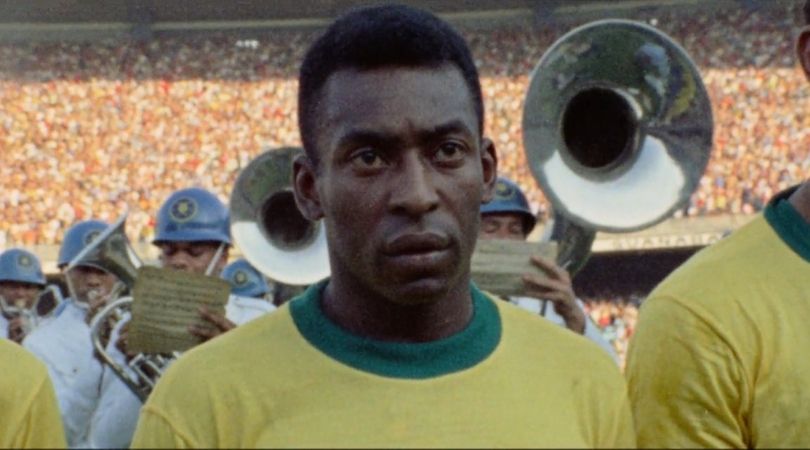
Pelé is a Netflix Original documentary, directed and produced by David Tryhorn and Ben Nicholas. The film is originally in Portuguese but an English dub is available as well as subtitles. The documentary is centered around Pelé, a legend of Santos, and the Brazilian national team. To many, he is considered the greatest footballer of all time; his country’s all-time record goalscorer. His life is detailed chronologically, starting from when he was a young boy in Brazil. As his career skyrockets and he grows in fame, the nation changes as well, showing off its emergence as a footballing and cultural powerhouse. The country quickly descends into a violent dictatorship, the documentary ending after the 1970 World Cup, the footballer’s last appearance at that level.
The film balances classic footage of football matches, news footage, and TV programs with interviews with those that were there at the time. There are those that were close to Pelé: his sister and an uncle, chiefly. There are his managers and teammates that shared a pitch with him, for Brazil and for Santos. And arguably the most crucial, there are conversations with the great man himself. These interviews are beautifully presented, allowing the subjects to speak freely and openly. And they are fascinating to someone that didn’t witness the player firsthand to see these figures talk about how great he was as a footballer. The footage of the goals is exciting, but the true emotion drips from the voices of those that were there.
The scenes with the legend in the present day are very touching and insightful. He is thoughtful and engaging as he speaks, the editing allowing him to gather his thoughts without appearing to hurry him. But his soul speaks within his eyes as he looks at a screen showing his old matches. The peaceful moments of him playing a musical instrument that bookends the beginning and end of the film help to calm the audience.
Something that Pelé shows brilliantly in all of its aspects is the passage of time. But there is a touch of sadness in regards to how they present this in footballers. There are lingering shots that seem to highlight the protagonist’s age, hinting at frailty. But he is not the only player that is interviewed in the present. His teammates often appear on screen after a still of them during their heyday, before revealing what they look like now. This causes a pang of sadness when you see that change. How these people deify Pelé while also regarding him as a friend is one of the more touching parts of the film. There is one point where Pelé has tea with his old Santos teammates, and that energy and connection they have is still so clear.
Not only is this a piece about one man, but it is also the story of an entire nation and its people. Pelé’s footballing career very much coincided with what may be considered the grandest of times for growing Brazilian football, but sadly the most tragic as well. In the late nineteen fifties and sixties, Brazil’s success at world cups awoke the world to the beauty of the nation. The filmmakers and those being interviewed speak about how the country began to grow in regards to industry and tourism and culture. The passion every single interview subject had for their country sends chills up the audience’s spines. But you also feel the pain when they talk about the awful period under a cruel dictatorship.
There are two contrasting halves to Pelé. The first half shows the jaw-dropping emergence of the player and his godlike status in the South American country and beyond. He becomes a sporting icon unlike any other at the time, crucial for Brazil. And he is adored by his nation to an extent very few other humans in existence could relate to.
But his horrible luck at the World Cup occurs at a similar time when the country slips into darkness. A fascist regime takes hold at a period of huge loss and national sadness. And such, there are many topics of conversation regarding Pelé’s lack of involvement and occasional involvement during that period. It is admirable that the documentary makers didn’t shy away from criticising him and asking him important questions in person. Journalists, writers, and other players cover multiple arguments, some even making hard-hitting comments towards him.
Having the centre of the conversation present is useful as it allows him to defend himself or clarify moments that may not be true. At the same time, some remarks he makes are contradicted by some of those that appear next. While his conduct is questioned, the love and adoration his fellow Brazilians have for him never falters.
There is a vulnerability towards the three-time World Cup winner that may not have been seen by modern football fans before. His social media presence has been that of celebrating his momentous achievements like he is an impenetrable god. And it isn’t just during the inquest into how he was used by the dictatorship but also within himself. He is brought to tears on multiple occasions and he mentions the doubt he constantly felt even at the top of his game. This is incredibly humanising towards a legend.

As Pelé and Brazil evolved, the same can be said for both football and technology. How the classic footage is used and adapted by the filmmakers is beautiful and shows dedication. The atmosphere in the matches can be felt at all times, even in black and white. The first World Cup mentioned, when Pelé was very young, could only be experienced via radio. But as Brazil started to become known within the footballing community, it became viewable in black and white. And the climactic 1970 tournament is in gorgeous colour.
The black and white footage appears to have been remastered somewhat, as have some of the tapes in colour. They look stunning and clear, displayed on screen perfectly. The audience is treated to Pelé dancing with the football as he demolishes defenses. The sound design could be considered haunting in places, in particular when showing the horror of the military takeover. Screams and music are played at an uncomfortable pitch, unsettling those watching even further.
Pelé is not a football documentary. It is the tale of one man and one nation, presented gloriously. Hearing the stories be told from those that were actually there feels truly special. So much of the history of Brazil is told all through the actions of a remarkable individual. His importance bleeds out of every moment, whether in the present day or the captivating classic footage.
The events within the documentary may have been told before, but having Pelé there to correlate or refute facts changes how the audience may react to it. It is his physical presence that makes this movie perfect. It takes that history, that legacy, and then directs the audience to the man that made it. There are quiet moments where it does feel like you are getting glimpses into his soul.
There are dubs that translate the dialogue into multiple languages, but it is very worth watching as the subjects speak in their native Portuguese. It allows you to hear the emotion in their voices and adds to the experience. And what an immersive experience it is.
Pelé is available now on Netflix.
Pelé
-
Rating - 10/1010/10
TL;DR
Pelé is not a football documentary. It is the tale of one man and one nation, presented gloriously. Hearing the stories be told from those that were actually there feels truly special. So much of the history of Brazil is told all through the actions of a remarkable individual. His importance bleeds out of every moment, whether in the present day or the captivating classic footage. The events within the documentary may have been told before, but having Pelé there to correlate or refute facts changes how the audience may react to it. There are dubs that translate the dialogue into multiple languages, but it is very worth watching as the subjects speak in their native Portuguese. It allows you to hear the emotion in their voices and adds to the experience. And what an experience it is.




